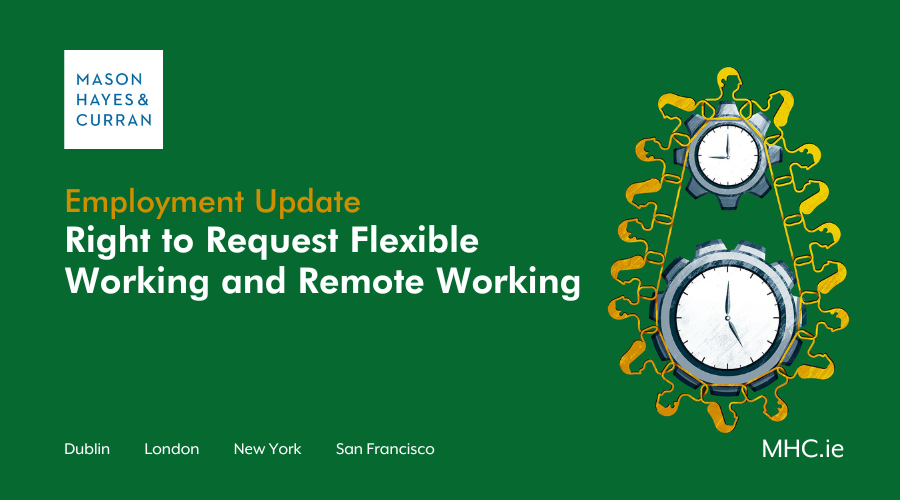Right to Request Flexible Working and Remote Working
WRC Code of Practice published

The Workplace Relations Commission has published the highly anticipated Code of Practice on the Right to Request Flexible Working and the Right to Request Remote Working. Our Employment & Benefits team reviews the impact of this new code and the key issues employers must consider when updating their policies.
The Workplace Relations Commission (WRC) recently published the long-awaited Code of Practice on the Right to Request Flexible Working and the Right to Request Remote Working (the Code). The Code is a key part of the Work Life Balance and Miscellaneous Provisions Act 2023. Though not legally binding, the Code sets out best practice regarding how employers can deal with requests made by employees for flexible or remote working.
The Code provides:
- Certain employees with a right to request flexible working for caring purposes, and
- All employees with a right to request remote working.
The Code does not provide employees with an automatic right to flexible or remote working but employers are required to consider requests by employees for such arrangements. We set out the key issues employers should consider when dealing with these requests.
Eligibility
Under the Code, employees can request flexible or remote working from their first day of employment. However, they are required to have 6 months’ continuous service with their employer before any arrangement can start. Employers can choose to waive this requirement.
All employees are eligible to request remote working. To be eligible to request flexible working, i.e. a variation in working hours or days worked, working compressed hours or remote working, an employee must be:
- A parent or certain persons acting in place of a parent, of a child under 12, or under 16 if the child has a disability or illness, who will be providing care to that child, or
- Providing
personal care or support to another specified person, i.e. the employee’s child, spouse, civil partner, cohabitant, parent, grandparent, sibling or other person who resides with the employee. That person must also require significant care or support for a serious medical reason.
Making a request
Employees should apply for flexible or remote working as soon is reasonably practicable, but no later than 8 weeks before the proposed start of the arrangement. Requests should be in writing and signed by the employee and should note:
- Details of the proposed arrangement, i.e. the form of flexible working being sought or the days on which an employee is seeking to work remotely
- The proposed start date and duration of the arrangement, if relevant, and
- Specific reasons for making the request and details of the suitability of the proposed working location when requesting remote working.
Employees requesting flexible working are encouraged to provide documentation/information in their application setting out:
- Details of the person whom the request relates to
- The employee’s connection to that person, and
- Evidence of the significant care or support required by an individual, where relevant.
An employer can request additional information/documentation where reasonably required to consider a flexible working request.
Right to a response and records
The Code states that employers should respond to requests for flexible or remote working as soon as reasonably practicable, but no later than 4 weeks from receiving the request. This period can be extended for a further period not exceeding 8 weeks where an employer has difficulty assessing the request. Within 4 weeks of receiving the request, an employer must either:
- Approve the request - this must be recorded in an agreement signed by the employer and employee detailing the agreed arrangement, its start date and duration, if applicable
- Refuse the request - this must be by written notice and set out the reasons for refusal, or
- Notify the employee that more time is needed to assess the request.
Employers can make flexible or remote working arrangements subject to an initial trial period. An employer must retain a copy of any signed agreements and notices and should append these to the employee’s contract of employment and provide employees with a copy.
An employer who receives a request for flexible or remote working must consider the request, having regard to the:
- Employer’s business needs
- Employee’s needs, i.e. their reasons for the request, and
- Guidance contained in the Code.
The Code lists various factors that an employer can consider in dealing with requests, including regarding the suitability of a role/an employee for flexible or remote working.
Arrangements can be changed on the agreement of both an employer and an employee. In specific circumstances set out in the Code, an employer can terminate an arrangement. Employees may also request to terminate an arrangement and return to their original work arrangement.
Top tips for employers
Employers should review and update their flexible and remote working policies to ensure that these comply with the Code. This can be taken into account in proceedings before the WRC and the Labour Court.
Employers should ensure, in implementing flexible or remote working arrangements, that:
- Requests are considered within the timeframes set out in the Act. Where an employer fails to consider a request for flexible or remote working, employees may be awarded compensation of up to 20 weeks’ (flexible working) or 4 weeks’ (remote working).
- The requirements of Irish working time workplace health and safety legislation are adhered to.
- Employees can raise concerns where they feel a request has not been properly considered and are penalised for exercising their rights.
- Records are retained as required by the Code. Failure to do so may result in fines of up to €2,500.
For more information and expert advice, contact a member of our Employment Law & Benefits team.
The content of this article is provided for information purposes only and does not constitute legal or other advice.
Share this:



